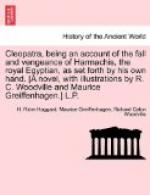“He is a strange man, I tell thee, noble Antony, and a learned. Myself, at times, I almost fear him, for he is deeply versed in the ancient arts of Egypt. Knowest thou that the man is of royal blood, and once he plotted to slay me? But I won him over, and slew him not, for he had the key to secrets that I fain would learn; and, indeed, I loved his wisdom, and to listen to his deep talk of all hidden things.”
“By Bacchus, I grow jealous of the knave! And now, Egypt?”
“And now I have sucked his knowledge dry, and have no more cause to fear him. Didst thou not see that I have made him stand these three nights a slave amid my slaves, and call aloud the hours as they fled in festival. No captive King marching in thy Roman triumphs can have suffered pangs so keen as that proud Egyptian Prince when he stood shamed behind my couch.”
Here Charmion laid her hand on mine and pressed it, as though in tenderness.
“Well, he shall trouble us no more with his words of evil omen,” Cleopatra went on slowly; “to-morrow morn he dies—dies swiftly and in secret, leaving no trace of what his fate has been. On this is my mind fixed; of a truth, noble Antony, it is fixed. Even as I speak the fear of this man grows and gathers in my breast. Half am I minded to give the word even now, for I breathe not freely till he be dead,” and she made as though to rise.
“Let it be till morning,” he said, catching her by the hand; “the soldiers drink, and the deed will be ill done. ’Tis pity too. I love not to think of men slaughtered in their sleep.”
“In the morning, perchance, the hawk may have flown,” she answered, pondering. “He hath keen ears, this Harmachis, and can summon things to aid him that are not of the earth. Perchance, even now he hears me in the spirit; for, of a truth, I seem to feel his presence breathing round me. I could tell thee—but no, let him be! Noble Antony, be my tiring-woman and loose me this crown of gold, it chafes my brow. Be gentle, hurt me not—so.”
He lifted the uraeus crown from her brows, and she shook loose her heavy weight of hair that fell about her like a garment.
“Take back thy crown, royal Egypt,” he said, speaking low, “take it from my hand; I will not rob thee of it, but rather set it more firmly on that beauteous brow.”
“What means my Lord?” she asked, smiling and looking into his eyes.
“What mean I? Why then, this: thou camest hither at my bidding to make answer of the charges laid against thee as to matters politic. And knowest thou, Egypt, that hadst thou been other than thou art thou hadst not gone back to queen it on the Nile; for of this I am sure, the charges against thee are true in fact. But, being what thou art—and look thou! never did Nature serve a woman better!—I forgive thee all. For the sake of thy grace and beauty I forgive thee that which had not been forgiven to virtue, or to patriotism, or to the dignity of age! See now how good a thing is woman’s wit and loveliness, that can make kings forget their duty and cozen even blindfolded Justice to peep ere she lifts her sword! Take back thy crown, O Egypt! It is now my care that, though it be heavy, it shall not chafe thee.”




